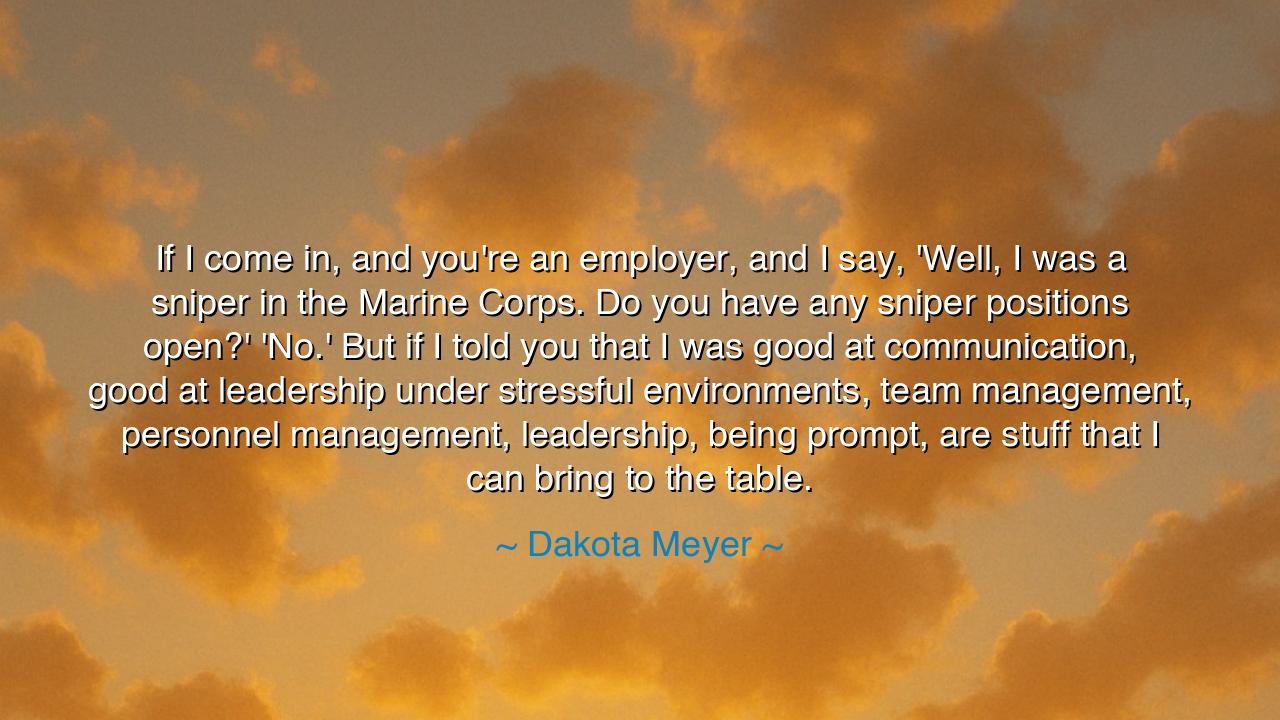
If I come in, and you're an employer, and I say, 'Well, I was a
If I come in, and you're an employer, and I say, 'Well, I was a sniper in the Marine Corps. Do you have any sniper positions open?' 'No.' But if I told you that I was good at communication, good at leadership under stressful environments, team management, personnel management, leadership, being prompt, are stuff that I can bring to the table.






Opening Scene
The morning light filters through the window, casting a gentle glow across the living room. Jeeny sits on the couch, a coffee mug in her hands, her gaze focused on the notebook in her lap. Jack is pacing slowly by the window, his steps measured, his thoughts clearly elsewhere. The air is calm, but there’s an underlying current of thoughtfulness between them. The words from Dakota Meyer have been lingering in the back of both their minds, the idea of how we define skills and experience, especially when they don’t fit into conventional boxes.
Host: The stillness in the room is broken by the soft sound of footsteps as Jeeny looks up at Jack, her expression soft but curious. The weight of the quote seems to hang between them, a question about how we see and value the skills we bring to the table, regardless of where they come from. Jeeny speaks first, her voice low but clear.
Jeeny:
(softly, almost to herself)
“You know, Dakota Meyer said something that really stuck with me. He talked about how when you’re applying for a job, people might not see your experience for what it is. Like, if you say you were a sniper in the Marine Corps, the employer might not have a direct position for you. But if you frame it as being skilled in leadership, communication, and team management, suddenly it feels like you have something to offer.”
Jack:
(stopping, his voice thoughtful)
“Yeah, that’s interesting. It’s like you have to take the experiences that don’t fit into a typical job description and turn them into something relatable. People often look for a title or specific credentials, but those skills he mentioned—communication, leadership, teamwork—those are valuable in any position. It’s about showing how the skills translate, not just the job title.”
Host: Jeeny nods, her fingers lightly tracing the rim of her coffee cup as she reflects on his words. The idea that skills are often hidden beneath labels, that so much of what we bring to the table is misunderstood unless we can reframe it, begins to take shape between them. The room feels quieter now, as though the conversation is taking them to a deeper level of understanding.
Jeeny:
(softly, almost with a new realization)
“It’s like, instead of letting people define us by the roles we’ve held or the titles we’ve earned, we should be able to define ourselves by the qualities and skills we bring. Leadership, problem-solving, the ability to perform under stress — those are the things that matter. And they apply everywhere, not just in one specific job.”
Jack:
(nods slowly, his gaze distant as he processes her words)
“Exactly. It’s about recognizing what we’ve learned and how those lessons translate to any situation. The way we think, communicate, and manage others, that’s what employers want. The job title is just a small part of it. It’s the traits and experiences that come with it that really matter.”
Host: The idea hangs in the air, floating between them, and the room seems to feel lighter, filled with the possibility that skills are not tied to job descriptions, but to the value we bring through our experiences. Jeeny puts down her coffee cup and leans forward slightly, her voice growing softer as she considers the deeper implications of the conversation.
Jeeny:
(quietly, with a sense of clarity)
“So maybe the real question isn’t what we’ve done or the jobs we’ve held. Maybe it’s how we can translate our experiences into value for others. Maybe it’s about telling the story of what we’ve learned and how we can apply it, no matter what job we’re after.”
Jack:
(nods slowly, his voice gaining strength)
“Right. It’s about showing how our experiences have shaped us into people who can contribute in meaningful ways. It’s about taking ownership of our skills and understanding their value, even if they don’t fit neatly into a job description.”
Host: The room feels lighter now, the conversation shifting from uncertainty to clarity. The idea that we often overlook or undervalue our experiences in favor of titles and roles feels less oppressive, and instead, it becomes empowering. Jeeny and Jack both understand now that the value they bring to the world is not defined by traditional standards, but by the strengths they carry within themselves, the experiences that shape their unique contributions.
Jeeny:
(smiling, with a quiet confidence)
“It’s all about perspective, isn’t it? Taking what we’ve learned and finding ways to make it meaningful in the world we live in. That’s where the real power lies — in understanding what we bring, not in what we’ve been told we should be.”
Jack:
(smirking, his voice softer now)
“I guess it’s time we all started seeing our experiences for what they are — strengths, not limitations. We’ve got more to offer than we think.”
Host: The conversation fades into a comfortable silence, filled with the understanding that value doesn’t come from titles or predefined roles. It comes from the strength we carry within us, from the experiences that have shaped who we are, and from the willingness to translate those into something meaningful. Jeeny and Jack sit in the quiet comfort of knowing that the way they define themselves — and the value they offer — is far more than just the job they hold. It’s everything they’ve learned, everything they’ve experienced, and everything they have yet to offer.






AAdministratorAdministrator
Welcome, honored guests. Please leave a comment, we will respond soon